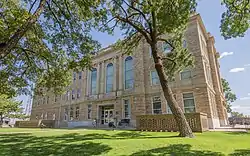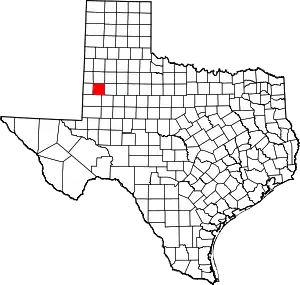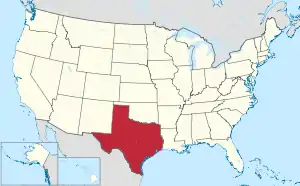Terry County | |
|---|---|
 The Terry County Courthouse in Brownfield | |
 Location within the U.S. state of Texas | |
 Texas's location within the U.S. | |
| Coordinates: 33°10′N 102°20′W / 33.17°N 102.34°W | |
| Country | |
| State | |
| Founded | 1904 |
| Named for | Benjamin Franklin Terry |
| Seat | Brownfield |
| Largest city | Brownfield |
| Area | |
| • Total | 891 sq mi (2,310 km2) |
| • Land | 889 sq mi (2,300 km2) |
| • Water | 2.1 sq mi (5 km2) 0.2% |
| Population (2020) | |
| • Total | 11,831 |
| • Density | 13/sq mi (5.1/km2) |
| Time zone | UTC−6 (Central) |
| • Summer (DST) | UTC−5 (CDT) |
| Congressional district | 19th |
| Website | www |
Terry County is a county located in the U.S. state of Texas. As of the 2020 census, its population was 11,831.[1] Its county seat is Brownfield.[2] The county was demarked in 1876 and organized in 1904.[3] It is named for Benjamin Franklin Terry, a colonel in the Confederate Army. Terry County was one of 46 dry counties in the state of Texas, but is now a moist county.[4] Terry County is one of the most productive pumpkin producing counties in the United States.[5]
History
Terry County was formed from Bexar County in 1876 and named for Col. Benjamin Franklin Terry, who commanded the Terry's Texas Rangers in the Civil War.[6]
In 1877, the ill-fated Nolan Expedition crossed the county in search of livestock stolen by Comanche renegades. The various Indian tribes had moved on by the time of white settlement, due to the depletion of the buffalo herds by hunters.[7]
Terry County was organized in 1904, with Brownfield as the county seat.[8]
The county was settled by ranchers such as Ira J. Coulver, J. R. Quinn, Englishman Q. Bone, and Marion V. Brownfield.[8] By 1910 Terry County had 235 farms and 23,000 acres (93 km2) of improved land, with corn being the most important crop.[8]
Terry County lies in the oil-rich north Permian Basin, and the discovery of oil in 1940 quickly led to production.[8] By 1991 almost 363,143,000 barrels (57,735,100 m3) of crude had been extracted from Terry County lands since 1940.[9]
In 1991, Terry County was among the leading cotton counties in Texas.[8]
Geography
According to the U.S. Census Bureau, the county has a total area of 891 square miles (2,310 km2), of which 889 square miles (2,300 km2) are land and 2.1 square miles (5.4 km2) (0.2%) are covered by water.[10]
Major highways
Adjacent counties
- Hockley County (north)
- Lynn County (east)
- Dawson County (southeast)
- Gaines County (south)
- Yoakum County (west)
- Cochran County (northwest)
- Lubbock County (northeast)
Demographics
| Census | Pop. | Note | %± |
|---|---|---|---|
| 1890 | 21 | — | |
| 1900 | 48 | 128.6% | |
| 1910 | 1,474 | 2,970.8% | |
| 1920 | 2,236 | 51.7% | |
| 1930 | 8,883 | 297.3% | |
| 1940 | 11,160 | 25.6% | |
| 1950 | 13,107 | 17.4% | |
| 1960 | 16,286 | 24.3% | |
| 1970 | 14,118 | −13.3% | |
| 1980 | 14,581 | 3.3% | |
| 1990 | 13,218 | −9.3% | |
| 2000 | 12,761 | −3.5% | |
| 2010 | 12,651 | −0.9% | |
| 2020 | 11,831 | −6.5% | |
| U.S. Decennial Census[11] 1850–2010[12] 2010[13] 2020[14] | |||
| Race / Ethnicity | Pop 2010[13] | Pop 2020[14] | % 2010 | % 2020 |
|---|---|---|---|---|
| White alone (NH) | 5,747 | 4,599 | 45.43% | 38.87% |
| Black or African American alone (NH) | 565 | 389 | 4.47% | 3.29% |
| Native American or Alaska Native alone (NH) | 28 | 29 | 0.22% | 0.25% |
| Asian alone (NH) | 23 | 37 | 0.18% | 0.31% |
| Pacific Islander alone (NH) | 0 | 0 | 0.00% | 0.00% |
| Some Other Race alone (NH) | 5 | 24 | 0.04% | 0.20% |
| Mixed Race/Multi-Racial (NH) | 72 | 184 | 0.57% | 1.56% |
| Hispanic or Latino (any race) | 6,211 | 6,569 | 49.09% | 55.52% |
| Total | 12,651 | 11,831 | 100.00% | 100.00% |
Note: the US Census treats Hispanic/Latino as an ethnic category. This table excludes Latinos from the racial categories and assigns them to a separate category. Hispanics/Latinos can be of any race.
As of the census[15] of 2000, 12,761 people, 4,278 households, and 3,247 families were residing in the county. The population density was 14 people per square mile (5.4 people/km2). The 5,087 housing units had an average density of 6 units per square mile (2.3 units/km2). The racial makeup of the county was 76.55% White, 5.00% African American, 0.53% Native American, 0.22% Asian, 14.30% from other races, and 3.40% from two or more races. About 44.09% of the population were Hispanics or Latinos of any race.
Of the 4,278 households, 35.80% had children under the age of 18 living with them, 59.70% were married couples living together, 11.90% had a female householder with no husband present, and 24.10% were not families. About 22.10% of all households were made up of individuals, and 12.30% had someone living alone who was 65 years of age or older. The average household size was 2.76, and the average family size was 3.23.
The county's age distribution was 28.40% under 18, 9.50% from 18 to 24, 27.00% from 25 to 44, 20.60% from 45 to 64, and 14.60% who were 65 or older. The median age was 35 years. For every 100 females, there were 108.00 males. For every 100 females age 18 and over, there were 109.50 males.
The median income for a household in the county was $28,090, and for a family was $33,339. Males had a median income of $24,321 versus $20,131 for females. The per capita income for the county was $13,860. About 19.20% of families and 23.30% of the population were below the poverty line, including 32.50% of those under age 18 and 13.90% of those age 65 or over.
Media
The county is served by a weekly newspaper, nearby station KPET 690 AM (Lamesa), and the various Lubbock radio and TV stations. KKUB-AM and KTTU-FM are licensed to Brownfield, but operate primarily from offices and studios in Lubbock.
Communities
Cities
- Brownfield (county seat)
- Wellman
Town
Unincorporated communities
Politics
| Year | Republican | Democratic | Third party | |||
|---|---|---|---|---|---|---|
| No. | % | No. | % | No. | % | |
| 2020 | 2,812 | 77.85% | 757 | 20.96% | 43 | 1.19% |
| 2016 | 2,459 | 73.29% | 753 | 22.44% | 143 | 4.26% |
| 2012 | 2,602 | 70.15% | 1,059 | 28.55% | 48 | 1.29% |
| 2008 | 2,879 | 67.27% | 1,379 | 32.22% | 22 | 0.51% |
| 2004 | 3,166 | 79.75% | 794 | 20.00% | 10 | 0.25% |
| 2000 | 2,910 | 71.78% | 1,108 | 27.33% | 36 | 0.89% |
| 1996 | 2,013 | 56.43% | 1,272 | 35.66% | 282 | 7.91% |
| 1992 | 2,309 | 52.54% | 1,461 | 33.24% | 625 | 14.22% |
| 1988 | 2,645 | 57.50% | 1,941 | 42.20% | 14 | 0.30% |
| 1984 | 3,181 | 67.34% | 1,535 | 32.49% | 8 | 0.17% |
| 1980 | 3,178 | 61.17% | 1,945 | 37.44% | 72 | 1.39% |
| 1976 | 2,113 | 42.25% | 2,859 | 57.17% | 29 | 0.58% |
| 1972 | 3,057 | 72.96% | 1,099 | 26.23% | 34 | 0.81% |
| 1968 | 1,948 | 44.00% | 1,625 | 36.71% | 854 | 19.29% |
| 1964 | 1,592 | 34.37% | 3,034 | 65.50% | 6 | 0.13% |
| 1960 | 1,908 | 45.84% | 2,237 | 53.75% | 17 | 0.41% |
| 1956 | 1,473 | 41.78% | 2,050 | 58.14% | 3 | 0.09% |
| 1952 | 1,823 | 46.37% | 2,105 | 53.55% | 3 | 0.08% |
| 1948 | 236 | 8.79% | 2,283 | 85.03% | 166 | 6.18% |
| 1944 | 273 | 9.82% | 2,304 | 82.88% | 203 | 7.30% |
| 1940 | 145 | 6.41% | 2,116 | 93.59% | 0 | 0.00% |
| 1936 | 87 | 5.06% | 1,619 | 94.18% | 13 | 0.76% |
| 1932 | 87 | 5.64% | 1,448 | 93.84% | 8 | 0.52% |
| 1928 | 622 | 60.45% | 407 | 39.55% | 0 | 0.00% |
| 1924 | 160 | 15.98% | 823 | 82.22% | 18 | 1.80% |
| 1920 | 39 | 10.99% | 270 | 76.06% | 46 | 12.96% |
| 1916 | 1 | 0.68% | 146 | 99.32% | 0 | 0.00% |
| 1912 | 6 | 5.71% | 96 | 91.43% | 3 | 2.86% |
Education
School districts serving the county include:[17]
- Brownfield Independent School District
- Dawson Independent School District
- Loop Independent School District
- Meadow Independent School District
- O'Donnell Independent School District
- Ropes Independent School District
- Seagraves Independent School District
- Tahoka Independent School District
- Wellman-Union Consolidated Independent School District
The county is in the service area of South Plains College.[18]
See also
References
- ↑ "Terry County, Texas". United States Census Bureau. Retrieved February 23, 2021.
- ↑ "Find a County". National Association of Counties. Retrieved June 7, 2011.
- ↑ "Texas: Individual County Chronologies". Texas Atlas of Historical County Boundaries. The Newberry Library. 2008. Retrieved May 27, 2015.
- ↑ "Wet/Dry Status of Texas Counties as of November 2010". Texas Alcoholic Beverage Commission. Retrieved July 29, 2018.
- ↑ Ramos, Elliot (October 22, 2021). "Map: Where America's pumpkins come from". NBC News. Retrieved October 31, 2021.
- ↑ "TSHA | Terry County".
- ↑ "Buffalo Hunted to Near-Extinction Due to Lack of Government Regulation?". A Beginner's Guide to Freedom. August 2, 2007. Retrieved December 16, 2010.
- 1 2 3 4 5 Leffler, John; Hunt, William R. "Terry County, Texas". Handbook of Texas Online. Texas State Historical Association. Retrieved December 16, 2010.
- ↑ Kenneth c. Anderson (2) (1953). "AAPG Bulletin, Vol 37". AAPG Bulletin. American Assn of Petroleum Geologists. 37. doi:10.1306/5CEADC80-16BB-11D7-8645000102C1865D. Retrieved December 16, 2010.
{{cite journal}}: CS1 maint: numeric names: authors list (link) - ↑ "2010 Census Gazetteer Files". United States Census Bureau. August 22, 2012. Retrieved May 11, 2015.
- ↑ "Decennial Census of Population and Housing by Decade". US Census Bureau.
- ↑ "Texas Almanac: Population History of Counties from 1850–2010" (PDF). Texas Almanac. Archived (PDF) from the original on October 9, 2022. Retrieved May 11, 2015.
- 1 2 "P2 HISPANIC OR LATINO, AND NOT HISPANIC OR LATINO BY RACE - 2010: DEC Redistricting Data (PL 94-171) - Terry County, Texas". United States Census Bureau.
- 1 2 "P2 HISPANIC OR LATINO, AND NOT HISPANIC OR LATINO BY RACE - 2020: DEC Redistricting Data (PL 94-171) - Terry County, Texas". United States Census Bureau.
- ↑ "U.S. Census website". United States Census Bureau. Retrieved May 14, 2011.
- ↑ Leip, David. "Dave Leip's Atlas of U.S. Presidential Elections". uselectionatlas.org. Retrieved July 31, 2018.
- ↑ "2020 CENSUS - SCHOOL DISTRICT REFERENCE MAP: Terry County, TX" (PDF). U.S. Census Bureau. Archived (PDF) from the original on October 9, 2022. Retrieved June 29, 2022. - list
- ↑ Texas Education Code, Sec. 130.198. SOUTH PLAINS COLLEGE DISTRICT SERVICE AREA.